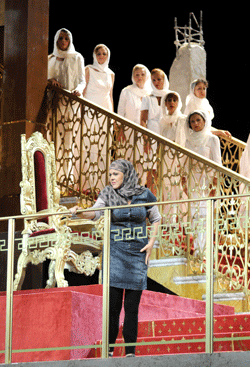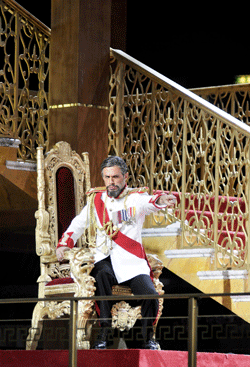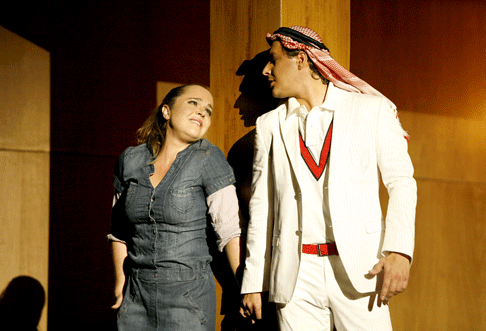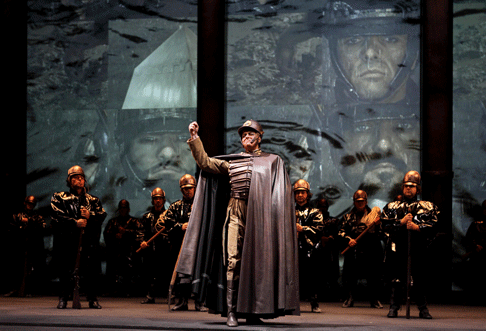27 Aug 2011
Mosé in Egitto and Adelaide di Borgogna in Pesaro
It was a no-brainer. The Old Testament Egyptians had to become today’s Palestinians.

It was a no-brainer. The Old Testament Egyptians had to become today’s Palestinians.
Well, the politics of the Graham Vick production were a bit confusing at first as Moses implored God to restore light to Egypt and He did in the most magnificent chorus of Andrea Leone Tottola’s azione tragico-sacra that ultimately parts the Red Sea and then drowns the Egyptians.
 Sonia Ganassi as Elcia
Sonia Ganassi as Elcia
But back to Egypt bathed in glorious light with the Egyptians confused about who was going to clean up the ostentatious palaces growing out of decayed reinforced concrete structures if the enslaved Jews were released. So they did not free the Jews after all to the relief of the scion of the ruling family who had fallen in love with an Hebrew maiden.
Moses, betrayed, implores God to rain fire on the Egyptians, and the Hebrews to a man, woman and child strap bombs onto their bodies while singing a most magnificent chorus. And, uhm, was that really Osama Bin Laden’s beard on Moses? We now fully understand that Graham Vick’s dramatic vocabulary is not politically literal. It is the storybook tragedy of the Old Testament magnified onto the now massive tragedy of Western Asia and the entire world.
 Alex Esposito as Faraone
Alex Esposito as Faraone
The enormity of the subject and its realization was full force in this sleepy seaside town, the birthplace of the great Rossini. Its 15,000 seat sports palace, the Adriatic Arena is now home to one of the three major productions of this August festival (the other two are in the 19th century Teatro Rossini). But wait! Walls and a ceiling (new this year — that nasty echo is no more) are installed, those 15,000 seats are reduced to 1200. A huge space remains for a scenic installation.
The drafty, leaky Adriatic Arena has become surprisingly one of the world’s most exciting opera venues. Opera there is out-of-the-box so to speak, and has been for several years, notably the scenic installations of Zelmira (2009) by Italian director Giorgio Barberio Corsetti (critics attacked its political illiteracies) and Cenerentola (2010) by Italian director Luca Ronconi. There are no directors more in-the-box than Graham Vick (the stage housings of the Met, San Francisco War Memorial, etc.). Maybe it should have been no surprise that he can ascend to the heights of the great Italian theater directors, but it was.
Rossini’s exquisitely beautiful third act prayer by Moses, Aaron, Elcia and chorus of Hebrews was punctuated by invisible sniper fire executing the Egyptian eldest sons (its sound mute, its victims’ fell sharply echoing the suddenness of the gunshot). Special forces commandos stormed the Adriatic Arena pursuing the Jews (some audience fled in terror [yes, this really happened]) for whom the sea parted for their crossing into the Promised Land. The Egyptians are destroyed but for one lone surviving boy. He straps a bomb onto his body as a lone Israeli soldier climbs out of a tank and offers him a detonator.
Wrenching.
Conductor Roberto Abbado had propelled the Zelmira to plateaux of lyric delirium as he had the Ermione (2008), a brilliant Adriatic Arena installation directed by his cousin Daniele Abbado. But this was another Rossini, the delirium replaced by lyric solemnity, much like the tone of the Rossini Stabat Mater, but with extended dramatic scenes for soloists. Bass Alex Esposito, the Egyptian pharaoh, exploded in his Cade dal ciglio il velo, terrifying in its runaway machismo. Tenor Dimitry Korchak, the pharaoh’s son and soon lover of the Hebrew girl Elcia lamented her loss in clumsy, brutal moves of male domination. Soprano Sonia Ganassi as Elcia tore at our hearts in her supplication to him to release Moses.
 Sonia Ganassi as Elcia and Dmitry Korchak as Osiride
Sonia Ganassi as Elcia and Dmitry Korchak as Osiride
New at the Rossini Festival productions this year were supertitles. Tottola’s text however is virtually incomprehensible in the archness of its style and the richness of its archaic vocabulary that fit the perceived gravity of a biblical subject. Never mind that the supertitles were washed out by the crescendo of brilliant light during the Eterno! immenso! incomprensibil Dio!, Maestro Abbado simultaneously effected a spine tingling choral crescendo that took us into and beyond the text, and kept us there until the opera’s final moment.
Ovations at the Rossini Festival are usually reserved for a singer who has executed a difficult aria with finesse, and these ovations are extended often over several minutes. Here these extended, very extended ovations occurred only at the ends of the acts, the astonished audience unwilling to leave its seats.
The individual performances were subsumed into the Graham Vick production of this Rossini masterwork. Nonetheless besides the flashy performances of brilliant singing mentioned above Riccardo Zanellato as Moses captured the anger and passivity of this complex personage with exceptional beauty of voice and delivery. Young Chinese Ylhe Shi as Aaron continues to mature as a Rossini tenor, here showing a new confidence that propelled this secondary character to unexpected emotional stature. The chorus of the Teatro Comunale of Bologna rose to unprecedented glory in its huge role as the Hebrews when not as the Egyptians.
The premiere of Adelaide di Borgogna was in December, 1817, the premiere of Mosé in Egitto in March, 1818, thus the two works were composed back to back and performed just now in Pesaro back to back. Both works chronicle the fall of a father and son, both works explore human relationships in politically charged atmospheres, and both end in hollow political victories.
The librettist, Giovanni Federico Schmidt had written the libretto for Armida (upcoming at the Met) earlier the same year. Adelaide di Borgogna was the wife of Lotario, the last Carolingian king of most everywhere in those days, though Schmidt is quite confused about dates and happenings. Never mind, as opera is about opera and not about history as Rossini and Graham Vick know.
In Schmidt’s libretto the widowed Adelaide is told by Lotario’s successor, Berengario that she must marry his son, thereby legitimizing the succession, You can imagine the rest of the story. And yes, she finally marries Ottone, making him Otto I, the first Holy Roman Emperor while Berengario and his son Adelberto are taken away in chains. The operatic problem is that Adelberto truly loves Adelaide, and that maybe Berengario did not murder Lotario after all.
 Daniela Barcellona as Ottone
Daniela Barcellona as Ottone
Italian avant-gardiste of the 1980’s Pier’Alli was the stage director. He also did sets, costumes, video projections and lights. He did not have Graham Vick’s good luck — no pregnant political metaphor comes to mind nor does the challenge of the Adriatic Arena present itself. But he did have video to play with, and that can be pretty cruel too.
The Teatro Rossini stage is small, challenging some contemporary metteurs en scéne to overcome this perceived limitation. Mr. Pier’Alli explored the digital technology that has exploded in theatrical scenic applications. Apparently no one informed Mr. Pier’Alli that you cannot watch a movie of a mud puddle and live opera at the same time, that moving images, particularly geometric images in absolute synchronization with musical architecture gets old fast, and that fast visual information (image stimuli) is not consistent with fast musical stimuli (Rossini, for example). Not least, Mr. Pier’Alli who trained as an architect is visually imprisoned by absolute structural symmetry. His mise en scéne was suffocating, if at best sort of pretty.
Against Schmidt’s strange account of historical happenings and this mise en scène Russian conductor Dmitri Jurowski deployed a score that is not one of the Rossini masterpieces, and maybe not all composed by Rossini anyway. The orchestra of the Teatro Comunale of Bologna responded with warmth of tone and obvious sympathy for the maestro whose tempos were indeed sympathetic to the needs of the singers. This maestro however did not connect with the Rossini ethos, and in this opera maybe Rossini does not either.
Mezzo soprano Daniella Barcellona is one of the Rossini Festival’s greatest treasures. Though she is surely the world’s prima donna assoluta of Rossini pants roles, even she could not make Ottone, the cardboard savior of poor Adelaide into a sympathetic hero. Our sympathies were with young Romanian tenor Bogdan Mihai as Adelberto whose vocal and histrionic innocence won us over to his father’s side. Australian soprano Jessica Pratt as Adelaide was the prize but her mannered piano singing and stolid presence captured none of the Rossini flash that could have made her operatically desirable to either suitor.
Mme. Pratt did know enough to hit her high E forte so she drew wild applause from an audience susceptible to the high is hard fallacy. On the other hand solid performances in high style were delivered by Italian baritone Nicola Ulivieri as a sympathetic Berengario and by Italian mezzo soprano Francesca Pierpaoli as Adelaide’s protector Iroldo, performances greatly appreciated by all of us Rossinians from around the globe.
Michael Milenski
N.B. Graham Vick’s Mosé in Egitto was cheered and wildly booed at its first performance, probably because Mr. Vick took a bow. Earlier that evening real riot police were brought in to quell a fight among spectators that broke out in the auditorium. At this second performance above the audience was enthralled, though perhaps there was one lone boo heard amidst the solid, extended applause.
Cast lists:
Adelaide di Borgogna
Ottone: Daniela Barcellona; Adelaide: Jessica Pratt; Berengario: Nicola Ulivieri; Adelberto: Bogdan Mihai; Eurice: Jeannette Fischer; Iroldo: Francesca Pierpaoli; Ernesto: Clemente Antonio Daliotti. Orchestra e Coro del Teatro Comunale di Bologna. Maestro del Coro Lorenzo Fratini. Direttore: Dmitri Jurowski. Regia, Scene, Costumi, Progetto Video e Luci: Pier'Alli.
Mosè in Egitto
Faraone: Alex Esposito; Amaltea: Olga Senderskaya; Osiride: Dmitry Korchak; Elcia: Sonia Ganassi; Mambre: Enea Scala; Mosè: Riccardo Zanellato; Aronne: Yijie Shi; Amenofi: Chiara Amarù. Orchestra e Coro del Teatro Comunale di Bologna. Maestro del Coro Lorenzo Fratini. Direttore: Roberto Abbado. Regia: Graham Vick. Scene e Costumi: Stuart Nunn. Progetto luci: Giuseppe Di Iorio.